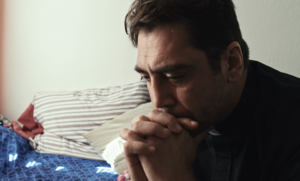
Still from ‘Thy Kingdom Come,’ produced by Beyond the Trees.
Artists can be up to many things, but I have always been drawn to those who bear witness.
“Poetry begins with listening,” says poet Sean Singer.
In this role the artist is a sort of Quan Am—she who listens to the world’s cries—or like the angels in Wings of Desire, who watch and listen. Part of the greatness of Chekhov is the sense that something sees the pain of the world from a great distance, with great sympathy.
Does it do any good to be heard and not to have your circumstances materially changed? I think it does, maybe more so when what is heard is spread with serious intent. It is as moving when good artists use their awareness and skill in this role as when someone with a rough background uses their knowledge to help instead of hurt.
I just found my way to a short film called Thy Kingdom Come (2018), in which Javier Bardem, dressed like a priest, listens to real people speak of their lives. “Filmed in a dozen homes, a trailer park, a county jail, and a local nursing facility, [it] is a melding of truth and fiction in which unscripted conversations, shot by [documentary photographer Eugene] Richards in beautiful widescreen, come to reveal the complexity of life” in rural Oklahoma.
The film is also an oddity for being repurposed from unused sequences in Terrence Malick’s To the Wonder (2012). In that film, Bardem plays a priest who has lost his faith. The sequences shot with non-actor townspeople, in which they “chose to share personal details of their lives,” were meant to show him doing his job as much from humanistic compassion as for religion. He is fallen, but more in the sense of Graham Greene’s “Catholic agnosticism” and of Greene’s whiskey priest as Christ-figure.
Malick’s To the Wonder is cinematographically experimental and has emotional consequence, but it features many shots of a young character dancing ecstatically in a field, then whirling, frightened and dramatic, as if wondering what cockle-burrs snagging her skirt mean existentially. Both the near-apostasy of Bardem’s character, and the dancing and whirling (and sullen wordless pacing of Ben Affleck) are absent in Thy Kingdom Come.
Richards and Bardem are said to have lobbied Malick to allow them to use the footage they shot, on the basis of respecting their subjects’ honesty and humanity, to make Thy Kingdom Come.
Bardem, in this odd situation of fictional priest in a real context that could easily have turned exploitative, serves instead as proxy for us in the room with Richards’ usual subjects—those in poverty, in pain, in prison.
“Is this a true story?” Bardem says in voiceover at the start. “Yes. I would say so. Is the priest a real priest? No. But it’s as if they were waiting for him.”
He is something more too. We cannot know if the subjects looked at Bardem and saw a millionaire actor, the bad guy in a Bond film, the psychopath Anton Chigurh in No Country for Old Men, the corrupt inquisitor in Goya’s Ghosts (2006), or if they willingly suspended disbelief and saw a priest. But what is interesting is that any of those might have made it possible for the act of “confession” and listening to occur.
Whatever Bardem’s power stems from, even if a menacing weirdness echoing from his characters, it works. He is, in a sense, the light to Chigurh’s dark—both staring, relentless, unafraid, and understanding of fate and misery. An actor friend told me that a method like Meisner would be perfect for this semi-documentary role, because it would keep Bardem present, authentic, and focused on the other person.
“What did you eat today?” Bardem asks a prisoner. They sit knee-to-knee on opposing bunks.
“Garbage, it’s all garbage,” the man says challengingly. He is not going to give.
“What did you drink today?”
“Nothin’. Nothin’ at all.” His eyes are angry.
“What did you dream today?” Bardem asks quietly and insistently.
“Nothin’. Nothin’ at all,” the man says, inches from Bardem’s face.
Bardem looks down, nods. They smoke.
“You know what?” Bardem says, looking up into the man’s eyes. “I don’t believe you. I don’t believe you at all.” The scene feels dangerous yet capable of resulting in true communication, and that may be in part because of who Bardem has been fictionally.
“It’s painful to die,” a woman with terminal cancer tells Bardem. Her little boy runs up to hug her. She says she is almost at the moment she should give up, but she has to live for her son. She says she does not know how people live with this kind of pain otherwise. Sometimes the pain is so bad she does not even want to be around him. “That’s hurtful,” she says quietly and begins to weep. There is no hope, other than her love. Bardem lays his hand on the back of her head. “It just hurts so much, dying this way,” she says. He holds her hand. She excuses herself to blow her nose, and he weeps too.
“The hardest part of it all,” a young mother whose baby drowned in the tub tells Bardem, “is explaining to anyone what happened. There’s not many people that’ll listen. And the ones that do listen judge me so quickly.” She weeps, and Bardem merely holds her hands.
There can be nothing acted here, but it has power and glory.
